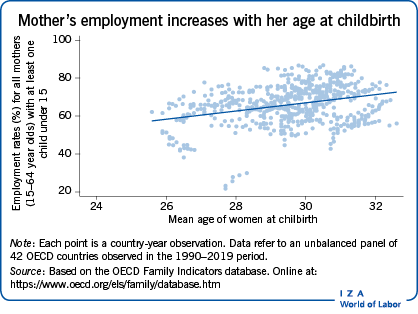Elevator pitch
The rise in the average age of women bearing their first child is a well-established demographic trend in recent decades. Postponed childbearing can have important consequences for the mothers and, at a macro level, for the country in which they live. Research has primarily focused on the effect postponing fertility has on mothers’ labor market outcomes and on the total number of children a woman has in her lifetime. Most research finds that postponing the first birth raises a mother's labor force participation and wages but may have negative effects on overall fertility, especially in the absence of supportive family-friendly policies.

Key findings
Pros
Postponing childbearing helps women accumulate more work experience (human capital).
Postponing childbearing strengthens women’s attachment to the labor market and raises wages.
Family-friendly policies can mitigate the negative effects of postponing childbearing on total fertility.
Egg freezing and in-vitro fertilization may help women who delay motherhood bear children at an older age.
Cons
Postponing childbearing may have negative consequences on women’s total fertility.
It is difficult to assess the causal effects of postponing childbearing because of unobserved differences among women.
Differences in the measures of postponement and in the proxies of labor attachment make results from the literature hard to compare.
Cross-country comparative research is lacking with respect to the impact of family-friendly policies on motherhood wage and employment penalties.
More research is needed to assess the unintended consequences of egg freezing and in-vitro fertilization, such as further postponement of childbearing.